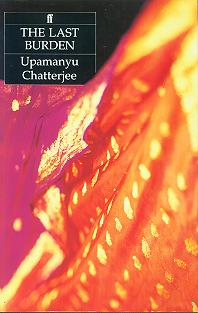The Last Burden
The Cover of The Last Burden
I finished reading The Last Burden by Upamanyu Chatterjee. With this, I have read all of Chatterjee's novels :-).
Upamanyu Chatterjee was born in 1959 at Patna, Bihar. After studying English literature at Delhi University, he joined the Indian Administrative Services(IAS) in 1983. His first novel was English, August - a wickedly delightful account of the experiences of Agastya Sen, August to his friends - a city slicker, an IAS officer posted to the very rural Madna. The book was nothing short of a masterpiece. Ummm. He followed this up with 2 novels - The Last Burden (1993) and The Mammaries of the Welfare State (2000), a sequel to his first one and a very good one at that.
“...it might well be used for an hors d'oeuvre, a phrase which its customers will not fathom unless pronounced as 'whores dee overs', like Punjabi streetwalkers at cricket.”The book is a brilliant depiction of life in an Indian middle-class family at the end of the 20th century. The central character here is Jamun, a bachelor, the son of Urmila & Shyamanand. His elder brother is Burfi who is married to a Christian, Joyce. Burfi has two children Pista & Doom aged 10 & 4 respectively. Kasturi, Jamun's girlfriend who is now married to a certain Agastya (who is nowhere as colourful as the "English, August" one) and pregnant too, Satyavan Hegiste, a Marathi fellow and Kuki - Jamun's friends, Kasibai - Jamun's maid and her son Vaman, Shyamanand's niece Chhana, Urmila's cardiologist Haldia are a few of the other characters in the book. The story begins with Jamun being intimated of his mother's illness. He returns home and sees that both his parents are fading away. So he decides to stay on till one of them expires. What transpires during the rest of his stay and the manner in which he bears his 'last burden' is for you to find out.
“But we're all feeble, he assents to himself, and heedless, glutted with vanity, and languish only after trumpery; and in a flash there remains no time to articulate one's love to those whom one owes love.”The usual hallmarks of Chatterjee's writing are all there - large doses of humour, heavy usage of obscure words especially those used in literary & formal situations, creative sentence construction, characters with various hues of grey, the kinky situations, even the minutiae associated with India and its people. Moreover a strong undercurrent of depression can be observed in the book's flow, though this is offset to a large extent by the wryness of Chatterjee's humour.
“...all the commonplaces that describe death are so befitting, aren't they? That a light, or a spark, or a glow within, that was most naked at the eyes, is now stubbed out. That what survives is a shell, an untenanted house, the desiccated flesh of the fruit from which the sap's been siphoned off...”The first chapter is titled "August", but here the allusion is to the month, not to the protagonist of "English, August". Compared to "English, August", this book is quite sombre and commercially too, was not as successful, the reason for the same being attributed to the seriousness of the book. The numerous squabbles in the family, the abjectness of some of the characters, their decadence, Jamun's recollections and various other situations all serve to heighten the book's poignancy.
All in all, a recommended read, at least for Chatterjee's fans.






5 Comments:
Chatterjee is one of the best among Indian writers in English. BTW, have you read "The Mammaries..."?
Yeah, the 'hazar fucked' part was superb. August is one amazing character. Remember his mythomania? He says his wife is a breast cancer afflicted Norwegian. The 'Pumbali kankal has bum' part where the little girl actually says 'Bungaali Uncle has come', but he says that it is an ancient fertility chant or something & that it should not have been taught to the girl by her Aya. Talk of imagination!!!
"The Mammaries..." was comparatively more serious in tone than "English, August", but lighter compared to "The Last Burden". But it had its gems too, though fewer in number. Required much more effort for reading though.
i still havent been able to scournge enough of funds to go on a spree to buy books. all that i had was sadly spent on an excursion to 'ye olde tavern' at 'ye olde college'
bah...
Raj. Please post. I'm waiting.
~Mukka.
Post a Comment
<< Home